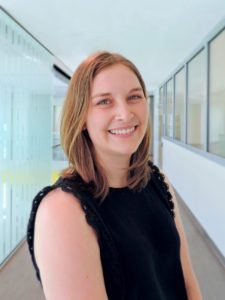Hi! I’m Prachi Fozdar, a Business and Mechanical Engineering undergraduate working as a communications & marketing intern here at CHEPS. I was recently able to interview Laura Ely, a master’s student studying Industrial & Operations Engineering (IOE) with a concentration in Healthcare Engineering & Patient Safety (HEPS), to find out more about her experience in HEPS.
What did you pursue your undergrad in & how long have you been in HEPS?
“During my undergrad, I majored in Industrial Engineering at Oregon State University (Go Beavers). I’ve now been in the Healthcare Engineering & Patient Safety Masters concentration through the IOE program for two semesters, with one semester left.”
How did you find out about the HEPS program and what about it specifically interested you?
“When I was applying to master’s programs I did a lot of research into universities with healthcare focuses within Industrial & Operations Engineering. I first looked into the University of Michigan because it’s a well established program and I had a few professors at Oregon State that went here. As I researched more, I found out about the HEPS concentration within the IOE program and I realized that this program would provide me with a lot of hands-on experience within a variety of my interests in healthcare engineering. Once I was accepted to the IOE master’s at Michigan, I reached out to a master’s student, Victoria Glunt, before applying for the HEPS concentration. While Victoria wasn’t part of the HEPS masters program, she was an IOE master’s student and worked at CHEPS at the time. She answered a lot of my questions and really loved working for CHEPS which got me really excited about working here!”
What does being a HEPS student look like outside of your involvement in CHEPS?
“Other than the requirement to work at CHEPS for 1 year, we just take a lot more healthcare-related classes, such as public health, than required in the general IOE Masters program. It’s interesting to see more of that healthcare perspective in the classroom.”
What has been your favorite project you worked on during your time at CHEPS?
“The Wayne County Medical Examiner’s Office Project! We were brought in because of process issues and challenges regarding decedent identification and location of next of kin. As a result of these problems, their office was facing capacity issues along with some negative press. The Medical Examiner’s Office wanted us to make general suggestions for process improvement, so we shadowed them and asked questions about their regular tasks. We witnessed difficult instances such as familial reluctance to claim a decedent and other financial challenges in which families struggled to cover burial costs. I was kept up at night a few times, but going in with Jose and Christy helped as we knew what the others had experienced and were able to talk about it. Ultimately, it was so interesting stepping into a job that I’ve never thought that much about and seeing behind the scenes and getting to learn about what their day is like is very different from any other project.”
What do you feel is the most valuable about being in the HEPS program and working at CHEPS?
“I’ve gained a lot of experience working across different areas of healthcare and in fields such as process improvement and consulting in order to make a direct impact. I also really appreciate the access to hospital resources we have through connections from various projects.”
What’s your favorite memory at CHEPS so far?
“My favorite memory was probably getting to go shadow at the Wayne County Medical Examiner’s Office because of how unique the experience was in addition to truly understanding the depth of the CHEPS community through the support I received from Jose and Christy.”
What are some important skills or takeaways you’ve gained from your time working at CHEPS?
“Organization and time management tools, specifically in terms of learning how to balance tasks amongst 4-5 people for a project especially during the school year when people have completely different schedules.”
What are your plans after you graduate this December?
“I’d be interested in working for a healthcare consulting company that’s somewhat similar to CHEPS but with more individual responsibility rather than group projects. I’m not quite set on anything and definitely open to other opportunities where I could learn and make an impact through my work.”
Do you have advice for anyone looking to pursue the HEPS concentration?
“Reach out to someone who is currently in the HEPS program and learn more about their experiences and what they like about CHEPS to make sure it’s a good fit for you. Like I mentioned earlier, what got me really excited was when I was talking to Victoria Glunt, a master’s student in CHEPS at the time.”

